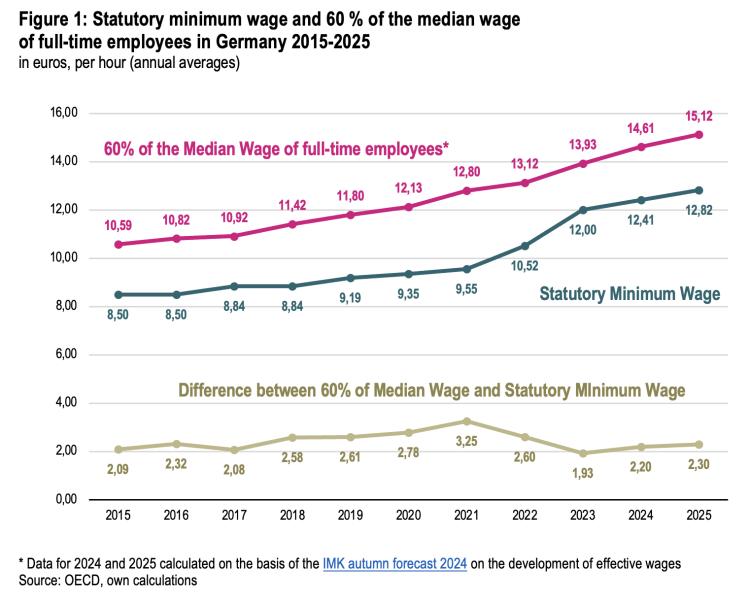The European Minimum Wage Directive (2022/2041) adopted in autumn 2022 is the first Europe-wide legal framework to enforce ‘adequate’ minimum wages throughout the European Union (European Parliament/Council of the EU 2022). EU member states must transpose the directive into national law by 15 November 2024. The German Federal Government has now officially announced that the requirements of the directive are already fulfilled by existing laws, such as the German Minimum Wage Act and that, in its view, no separate legal amendment is required. This decision is not only highly controversial in legal terms. Above all, it represents a missed political opportunity to enforce appropriate minimum wages in Germany.
Criteria for adequate Statutory Minimum Wages
The European Minimum Wage Directive requires all Member States that have a statutory minimum wage to set and regularly adjust it according to clearly defined criteria. While member states are essentially free to define and prioritise, the directive specifies four minimum criteria that must always be taken into account:
- „the purchasing power of statutory minimum wages, taking into account the cost of living;
- the general level of wages and their distribution;
- the growth rate of wages;
- long-term national productivity levels and developments” (Art. 5, para. 4, Directive (EU) 2022/2041).
The directive stipulates that “Member States shall use indicative reference values to guide their assessment of adequacy of statutory minimum wages.” More specifically, the directive states that Member States “may use indicative reference values commonly used at international level such as 60 per cent of the gross median wage and 50 per cent of the gross average wage, and/or indicative reference values used at national level” (Art. 5, para. 4, Directive (EU) 2022/2041). As the EU has no legal competence to set a binding minimum wage level, the member states’ final decision on the specific reference value remains. However, the directive strongly recommends the use of internationally recognised standards.
Deficits of the German Minimum Wage Regime
The German minimum wage regime is characterised by the fact that the development of the statutory minimum wage is determined not by the state but by a Minimum Wage Commission following the political determination of its initial level in 2015. According to the German Minimum Wage Act (MiLoG), this commission is made up of three employer and three trade union representatives plus an ‘independent’ chairperson (and two advisory academics) and regularly makes recommendations for the adjustment of the minimum wage. The only exception was an extraordinary minimum wage adjustment in autumn 2022, in which the minimum wage level was to be structurally increased with reference to the European Minimum Wage Directive.
The German Minimum Wage Act only sets out relatively general requirements for regular adjustments by the Minimum Wage Commission. The adjustment is to be made “in the context of an overall assessment which amount of the minimum wage can suitably contribute to providing workers with an appropriate minimum level of protection, to enabling fair and effective conditions of competition, and to not jeopardising employment.” In addition, when setting the minimum wage the Minimum Wage Commission “is subsequently guided by collective wage developments” (MiLoG, Art. 9, Para. 2).
In the first few years, the development of collectively agreed wages was the minimum consensus employers and trade unions could agree on when raising the minimum wage. However, it quickly became apparent that an exclusive focus on collectively agreed wages was insufficient to structurally increase the minimum wage to an appropriate level. The trade unions, therefore, support the reference value of 60 per cent of the median wage specified in the European Minimum Wage Directive as a lower limit for an appropriate minimum wage level and welcome the extraordinary minimum wage increase by the government. On the other hand, employers have opposed the European Minimum Wage Directive from the outset and have strictly rejected the reference value of 60 per cent of the median wage even after its adoption. Instead, in the most recent decision of the Minimum Wage Commission in the summer of 2023, they cancelled the previously consensual procedure and, together with the chairwoman and against the votes of the trade unions, brought about a majority decision for the first time. This only provided for a very small increase in the minimum wage and completely ignored the criteria of the European Minimum Wage Directive.
How high would the minimum wage in Germany have to be to correspond to 60 per cent of the median wage?
The fundamental problem with the German minimum wage regime is that, although it has a criterion for the development of the minimum wage in the form of the orientation towards collectively agreed wages, it lacks criteria for the adequate level of the minimum wage and thus simply perpetuates a minimum wage level once it has been set politically. The European Minimum Wage Directive now fills this regulatory gap with its recommendation for a reference value of 60 per cent of the median wage.
According to OECD calculations, the German minimum wage has fluctuated between 46 and 48 per cent of the median wage for full-time employees since its introduction. Only the extraordinary minimum wage increase to 12 euros caused this to rise temporarily to just under 52 per cent. As a result, the German minimum wage was generally at least two euros below the adequacy threshold of the European Minimum Wage Directive (Figure 1). To correspond to 60 per cent of the median wage, the statutory minimum wage would have had to be 10.59 euros when it was introduced in 2015 and raised to 14 euros by 2023. Based on the current wage development forecasts for 2024 and 2025, the minimum wage would have to rise to over 15 euros in 2025.

Adjusting the German Minimum Wage Act to the European Minimum Wage Directive
Whether an adjustment to the German Minimum Wage Act is necessary to implement the European Minimum Wage Directive is highly controversial in the legal debate in Germany. An expertise by the Scientific Service of the German Parliament concludes that the adjustment criteria of the Minimum Wage Act are so general and broad that they can also be interpreted in line with the European Minimum Wage Directive without the need for a legal amendment. Other legal scholars argue that the much more precise criteria of the European Minimum Wage Directive must also be explicitly adopted in the German Minimum Wage Act. Similar positions can also be found in other EU Member States, such as the Netherlands, which has fully incorporated the criteria of the European Minimum Wage Directive into its national minimum wage law.
The German Federal Government has supported teh view that no change to the Minimum Wage Act is necessary. However, in view of the recent decision by the Minimum Wage Commission, which the employers determined, the Federal Minister of Labour, Hubertus Heil, felt compelled to emphasise in an official letter that he considers the requirements of the European Minimum Wage Directive to be met “if the Minimum Wage Commission takes into account the reference value of 60 per cent of the gross median wage in the next adjustment decisions”.
In contrast, the German employers’ associations immediately made it clear in a letter to the Federal Minister of Labour that they consider the European Minimum Wage Directive’s reference value of 60 per cent of the median wage to be merely a non-binding benchmark that does not have to be applied in Germany. If it is to be ensured that the statutory minimum wage in Germany is no longer below the adequacy threshold of 60 per cent of the median wage, this objective should also be explicitly specified in the German Minimum Wage Act.
A broad political alliance, ranging from former ver.di head Frank Bsirske to the new CDA chairman and “father of the European Minimum Wage Directive” Dennis Radtke, is now calling for a corresponding amendment to the Minimum Wage Act. In this way, the recommendations of the European Minimum Wage Directive could be transformed into a binding regulation at national level.
Thorsten Schulten is Head of the collective agreements archive of the Institute of Economic and Social Research (WSI) at the Hans Böckler Stiftung. He is also an Honorary Professor at the Eberhard Karls University of Tübingen.

